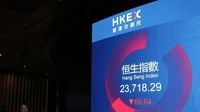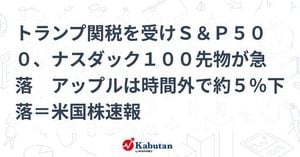The U.S. stock market experienced a volatile session on Tuesday, April 1, 2025, as investors braced for impending tariff announcements from the Trump administration. The Dow Jones Industrial Average slipped 0.2%, reflecting investor caution amidst rising economic uncertainty. In contrast, the S&P 500 managed to claw back some losses with a slight increase of 0.1%, while the Nasdaq Composite led the way with a 0.5% gain. This mixed performance highlights the tension in the market as traders await clarity on the administration's tariff plans.
As the countdown to President Trump's tariff announcement continues, the market's anxiety is palpable. Investors are left questioning whether the U.S. will impose sweeping reciprocal tariffs on trading partners or take a more measured approach. Analysts are predicting that the effective tariff rate could reach its highest level since the 1940s, a move that could further strain an economy already grappling with sluggish growth and persistent inflation.
During the first quarter of 2025, the S&P 500 saw a significant decline of 4.6%, marking its worst quarterly performance since July 2022. The Nasdaq Composite fared even worse, plummeting 10.5% as tech stocks faced steep sell-offs. The Dow Jones, while slightly more resilient, still lost 1.3% over the same period. The Russell 2000's performance remains unreported, but the general sentiment among investors is one of skittishness and high volatility.
In the wake of these developments, notable stocks and IPOs have also made headlines. The IPO of Newsmax (NMAX) saw a staggering 77% increase on its first trading day, while gold prices hit record highs due to escalating investor uncertainty. As the market grapples with these fluctuations, a looming question remains: how will the Federal Reserve react to these economic indicators?
In the U.S., futures are painting a gloomier picture. On Tuesday, Dow Jones futures dipped 0.3%, S&P 500 futures declined 0.5%, and Nasdaq 100 futures fell 0.6%. The caution stems from the anticipated tariff reveal, set for Wednesday, with additional auto tariffs expected on Thursday. Investors are anxiously awaiting the global response to these measures.
Job openings in February hit a four-year low, indicating a labor market that is losing steam. Manufacturing activity also slipped into contraction last month, with companies feeling the squeeze of rising costs—an issue exacerbated by the looming tariff policies. As the market braces for the impact of these tariffs, the potential for stagflation—a combination of high inflation and stagnant growth—looms large.
Meanwhile, European markets appear to be holding up amidst the trade jitters. The UK's FTSE 100 is projected to gain 31 points, opening at 8,689, while Germany's DAX is expected to rise 88 points to 22,251. France's CAC 40 and Italy's FTSE MIB are also trending upwards, adding 8 and 77 points respectively. This resilience is attributed to strong corporate earnings and optimism surrounding European Central Bank policy flexibility.
As investors digested reports on manufacturing activity and job openings, the mood remained cautious. The yield on the 10-year Treasury, which affects borrowing costs across various loans, was recently at 4.16%, down from 4.25% at the previous close. The decline in yield reflects growing concerns about the economy and the potential impact of tariffs on consumer prices and manufacturing costs.
In the tech sector, shares of major companies such as Tesla (TSLA), Microsoft (MSFT), Nvidia (NVDA), Alphabet (GOOG), Amazon (AMZN), and Meta Platforms (META) all gained more than 1%. Tesla, in particular, rose nearly 4% ahead of its first-quarter deliveries report, which is expected to reveal key insights into the company's performance amidst growing competition and market pressures.
However, not all sectors are thriving. Johnson & Johnson (JNJ) shares plunged 7.6% after a judge rejected a proposal to settle lawsuits alleging that its talc products cause cancer. This legal setback has left the company to navigate the tort system to address the claims. Airline stocks also faced pressure, with Southwest Airlines (LUV) shares dropping 5.9% following a downgrade from analysts at Jefferies, who cited concerns over consumer sentiment and the impact of tariffs on travel demand.
In the midst of all this, the outlook for big companies’ first-quarter earnings appears dim. Of the 107 S&P 500 companies to offer guidance, 68 have provided negative outlooks, exceeding the five- and ten-year averages. This trend has raised concerns about the path forward for stocks, as investors remain vigilant for any signs of a recession.
As the markets open on Wednesday, April 2, 2025, the Sensex and Nifty 50 in India are expected to follow a flat trajectory, reflecting mixed cues from global markets. The Indian stock market took a hit on Tuesday, with the Sensex dropping 1.80% and the Nifty 50 settling 1.50% lower. Investors are anxious about the potential repercussions of the U.S. tariffs on India's trade advantages.
With the U.S. job openings dropping significantly and manufacturing contracting, the economic landscape is increasingly uncertain. The upcoming March jobs report is anticipated to be a critical data point for market participants, as it could influence the Federal Reserve's next move regarding interest rates. As the markets await further developments, traders remain on edge, pondering whether stocks will rally or retreat further in the coming days.






